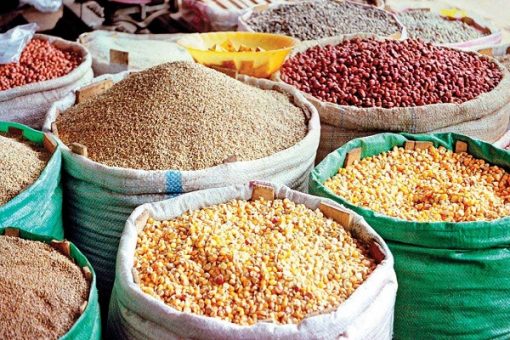From Okwe Obi, Abuja
To tackle the raging inflation, the federal government is considering suspension of tariffs, duties, and taxes on the importation of maize, husked brown rice, wheat, and cowpeas via land and sea borders.
The initiative is part of the Presidential Accelerated and Stabilisation Advancement Plan aimed at stabilising food prices and ensuring adequate supply across the country.
Also, the government is planning the importation of food commodities, including 250,000MT of wheat and 250,000MT to support small-scale processors and millers nationwide.
Sources revealed that government plans a continuous ramp-up of production for the 2024/2025 farming cycle, a sustained support to smallholder farmers in the ongoing wet season farming through existing government initiatives, and strengthening and accelerating dry season farming across the country.
Daily Sun gathered that the Renewed Hope National Livestock Transformation Implementation Committee would be inaugurated soon to develop and implement policies that prioritise
livestock development and ensure alignment with the National Livestock Transformation Plan.
Also, the stringent safety standards will be upheld to safeguard the quality and genetic composition of these imported food items.
Additionally, the plan includes setting Recommended Retail Prices (RRP) for these commodities and engaging stakeholders to establish a Guaranteed Minimum Price (GMP). Measures also involve ramping up agricultural production for the upcoming farming cycles, supporting smallholder farmers during the wet season, and boosting productivity through agricultural mechanization and irrigation development.
Furthermore, initiatives such as greenhouse cultivation for horticultural crops and collaborations with security agencies to cultivate arable lands underscore the government’s commitment to enhancing food security and stabilising prices.
The comprehensive approach aims to address food inflation challenges and strengthen Nigeria’s agricultural resilience in the face of economic uncertainties, it was gathered.
The National President of the Nigerian Association of Chambers of Commerce, Industry, Mines, and Agriculture (NACCIMA), Dele Oye, has commended government’s decision to suspend duties, tariffs, and taxes on the importation of key food commodities.
In a statement, Oye said the decision represents a significant step towards mitigating the severe food inflation currently impacting Nigerian households.
The NACCIMA President also applauded the 150-day duty-free import window for essential items such as maize, husked brown rice, wheat, and cowpeas, describing it as a commendable move that will stabilize food prices and provide much-needed relief to millions of Nigerians.
The statement read: “On behalf of the Nigerian Association of Chambers of Commerce, Industry, Mines, and Agriculture (NACCIMA), we commend the federal government’s decisive action to suspend duties, tariffs, and taxes on the importation of key food commodities.
“This initiative, announced by Honourable Minister Abubakar Kyari, represents a significant step towards mitigating the severe food inflation currently impacting Nigerian households.
“The 150-day duty-free import window for essential items such as maize, husked brown rice, wheat, and cowpeas is a commendable move that will likely stabilize food prices and provide much-needed relief to millions of Nigerians.
“By addressing the multiple factors contributing to rising food prices, including infrastructural challenges and market profiteering, this policy demonstrates a comprehensive approach to ensuring food affordability.”
Reiterating the need for stakeholders’ engagement, Oye further noted, “However, while we applaud these measures, it is imperative that the government immediately engages with stakeholders across the agricultural value chain.
“This engagement is crucial to ensure that Nigeria is not turned into a dumping ground for commodities where we already have reasonable self-sufficiency. Protecting local investments and sustaining the growth of our agricultural sector must remain a priority.”
He added, “NACCIMA stands ready to support the government in these efforts, ensuring that the strategic importation of food commodities complements rather than undermines our domestic agricultural production. Together, we can secure a balanced approach that safeguards both the immediate needs of our citizens and the long-term sustainability of our agricultural economy.”
